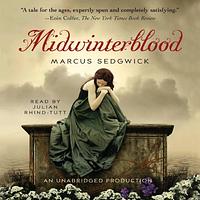Take a photo of a barcode or cover
Couldn't put this one down. A quick and engaging read.
Liked this book very much. It will likely appeal to teens, though there is nothing about it that really "makes" it teen.
Strange tales all a riff on a theme, prohibited love, and death. Listened to it a second time very Lovecraftian reincarnation vibe.
I really enjoyed the lead-up; I would have given this 5 stars if the ending hadn't been a little bit flat.
There is certainly a lot going on in these linked vignettes; and while this won't be for every reader, it is very well written and may appeal to high school students (and adults) who are looking for a more thoughtful and literary read.
Seven interconnected vignettes, traveling backwards in time as they explore the dark history of Blessed Island and the two figures--Eric and Merle--who reappear there. Midwinterblood feels like mainstream experimental literature: a welcome and creative deviation from convention, but neither as bold nor successful as it could be were it to take its premise further. Sedgewick's voice has a stylistic brevity, nearly bare of imagery but cold and beautiful in tone; combined with the variety and mystery of the vignette narrative, this is a compelling and extraordinarily swift read. But the book's recurrent elements are heavy-handed, and the underlying truths--of their symbolism, and the island--are disappointing: simplistic, manufactured, with no lasting resonance. So too are Eric and Merle, whose identities and relationship gain almost no depth through seven repetitions. Compare to Catherynne M. Valente's [b:Yume no Hon|865698|Yume No Hon The Book of Dreams|Catherynne M. Valente|http://d.gr-assets.com/books/1347433776s/865698.jpg|851100]: imagery-rich cyclically explored mysteries with intense complexity and a well-defined character. Compare to Tongari's "25 Lives": stylistically brief and deeply evocative micro-vignettes which create a pointed but open-ended narrative. Midwinterblood isn't bad--it's well-inspired and highly constructed, readable and rich with potential. But it lacks the artistry and the willingness to push further the strangeness of its content and the progress made in its reiterations which would make it realize that potential. I don't particularly recommend it.
So...this book was weird. It was one of those books that kinda makes me feel like I'm missing something and that, in turn, makes me feel kinda dumb. I'm not really a fan of those books.
I picked up the book because (1) it won the Printz award and (2) several friends were debating if it was actually YA. Having read it, I gotta admit that (1) I don't really understand why it won the award (I rarely do; I think it's a matter of taste) and (2) I don't really understand why it was classified as YA. Maybe because Erik and Merle, in their various incarnations, read largely as adolescents? There was a Romeo & Juliet feel to it -- mixed with a little The Lion, The Witch, and the Wardrobe. There were times too, when the writing felt a little juvenile.
But, nevertheless, I couldn't put it down. The writing, when it wasn't juvenile, was unsettlingly gorgeous. Even though I can't say I would pick it up again, I was driven to find out what happened, find out what was going on.
That being said...I couldn't get behind the book. It had little to do with the fact that it was dark and depressing and kinda creepy. It had little to do with the backwards chronology -- given the right plot, I think it's a cool (and refreshing) way to tell a story, like a puzzle that you slowly get the pieces to. Instead, it had more to do with the fact that I just didn't care about any of the characters. The vignette nature of the book was cool, but they were so short, and the links between them were very tenuous. That is, if you have star-crossed supernatural lovers, then they should be star-crossed lovers in all their incarnations. And I get that there's more than one way to define love and that love can take many forms, but they could have been siblings in every incarnation--just some consistency, I suppose.
I picked up the book because (1) it won the Printz award and (2) several friends were debating if it was actually YA. Having read it, I gotta admit that (1) I don't really understand why it won the award (I rarely do; I think it's a matter of taste) and (2) I don't really understand why it was classified as YA. Maybe because Erik and Merle, in their various incarnations, read largely as adolescents? There was a Romeo & Juliet feel to it -- mixed with a little The Lion, The Witch, and the Wardrobe. There were times too, when the writing felt a little juvenile.
But, nevertheless, I couldn't put it down. The writing, when it wasn't juvenile, was unsettlingly gorgeous. Even though I can't say I would pick it up again, I was driven to find out what happened, find out what was going on.
That being said...I couldn't get behind the book. It had little to do with the fact that it was dark and depressing and kinda creepy. It had little to do with the backwards chronology -- given the right plot, I think it's a cool (and refreshing) way to tell a story, like a puzzle that you slowly get the pieces to. Instead, it had more to do with the fact that I just didn't care about any of the characters. The vignette nature of the book was cool, but they were so short, and the links between them were very tenuous. That is, if you have star-crossed supernatural lovers, then they should be star-crossed lovers in all their incarnations. And I get that there's more than one way to define love and that love can take many forms, but they could have been siblings in every incarnation--just some consistency, I suppose.




